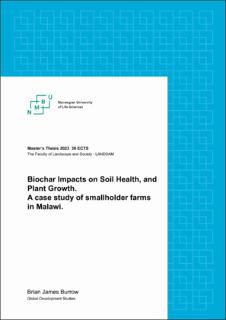| dc.description.abstract | Biochar, a promising soil amendment, has gained attention in Malawi as a sustainable solution for enhancing agricultural practices among smallholder farmers. This study investigates the diverse impacts of biochar application on soil health, plant growth, and inquires about environmental remediation in smallholder farms of Malawi.
Beginning with a comprehensive literature review, the research examines biochar properties, applications, and underlying mechanisms that drive its effects on soil quality and early plant performance. Employing a mixed-methods approach, this study integrates quantitative soil sample data and qualitative interview data to comprehensively understand the multifaceted advantages of biochar application on Malawian smallholder farms.
Thematic analysis of qualitative data reveals perceived benefits, including enhanced soil fertility, improved water management, pest control, and increased crop yields. Quantitative analysis compares soil samples against established soil quality standards and agricultural guidelines. Results indicate that biochar application treatments generally yield favorable outcomes.
For instance, the "Maize+Biochar+Manure" treatment in Nkhatabay shows higher levels of organic carbon (1.69%), aligning with the recommended range of 1% - 5% for improved soil fertility. Additionally, biochar application leads to elevated cation exchange capacity (CEC) levels. In the "Maize+Biochar" treatment at the Lilongwe farm, CEC levels reach 0.72 meq/100g, demonstrating enhanced nutrient retention capacity.
Conversely, the "No Biochar" treatment in Lilongwe exhibits lower organic carbon levels (0.99%) and suggests poor soil fertility potential. These quantitative findings corroborate qualitative observations, highlighting biochar's potential to positively influence soil health and agricultural productivity.
Drawing upon integrated qualitative and quantitative data, the study underscores biochar's transformative role in promoting sustainable agriculture. By recognizing both benefits and challenges, this research contributes to the knowledge base on sustainable agricultural practices and advocates for widespread biochar adoption in Malawi's smallholder farming systems.
The study concludes with evidence-based recommendations that guide effective biochar implementation for farmers, policymakers, and stakeholders. Emphasizing soil health, crop productivity, and environmental factors, these recommendations offer valuable insights for enhancing food security, mitigating environmental degradation, and uplifting the livelihoods of smallholder farmers amid climate change and resource limitations. | |
